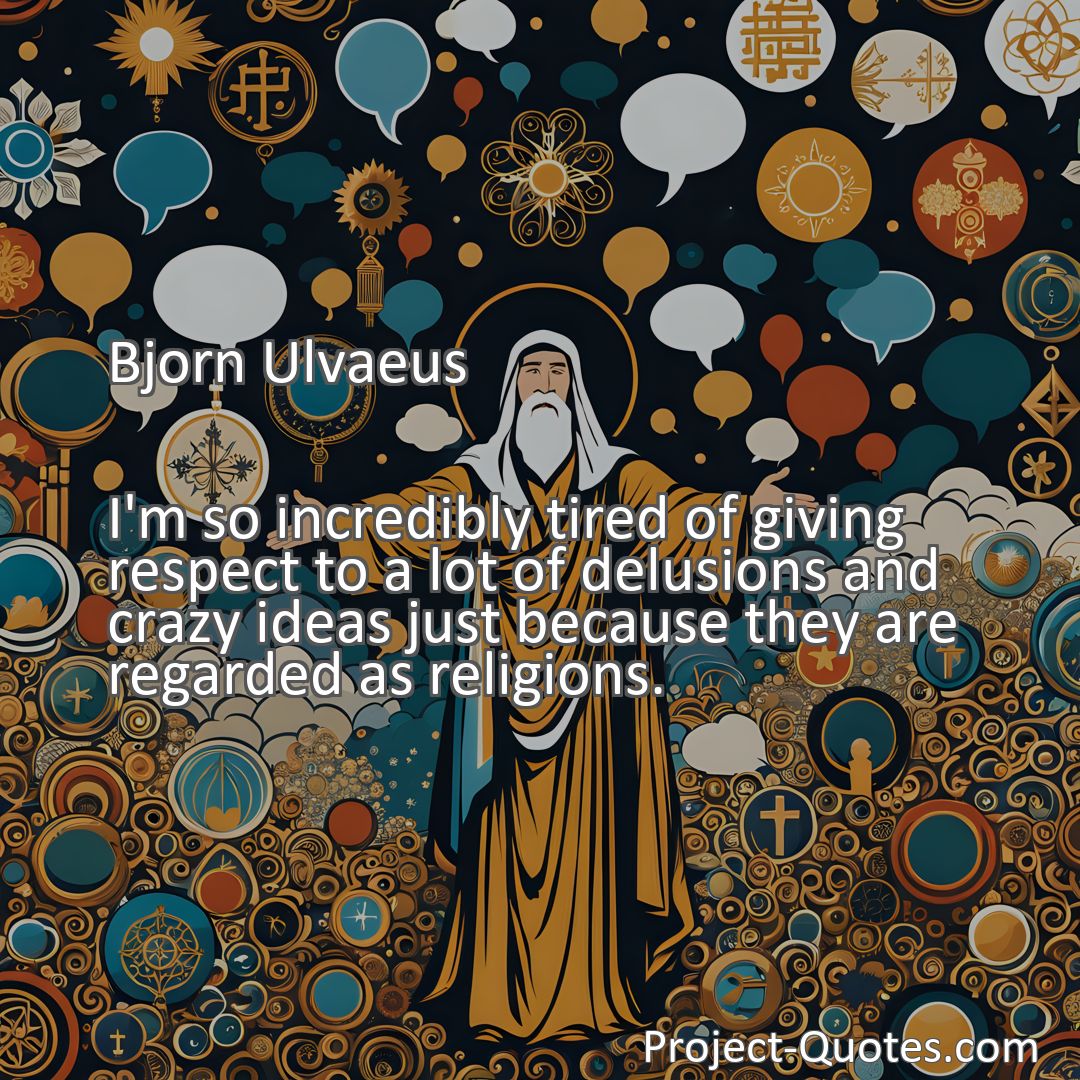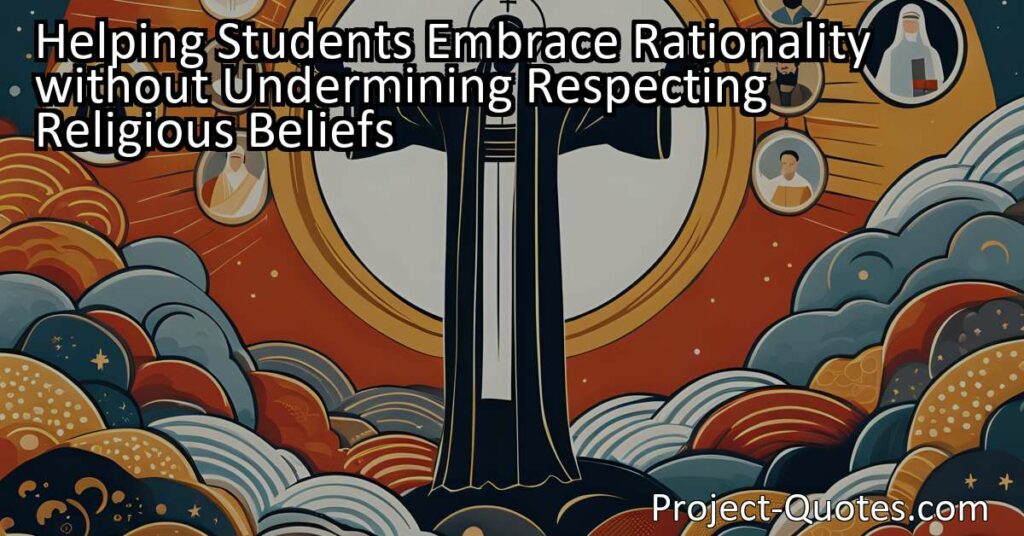I’m so incredibly tired of giving respect to a lot of delusions and crazy ideas just because they are regarded as religions.
Bjorn Ulvaeus
Helping Students Embrace Rationality without Undermining Respecting Religious Beliefs: This article explores the importance of questioning and challenging religious beliefs while still promoting respect and diversity. By encouraging critical thinking and open-mindedness, students can navigate between rationality and religious beliefs, fostering an inclusive and tolerant society.
Table of Contents
- 1 I’m so incredibly tired of giving respect to a lot of delusions and crazy ideas just because they are regarded as religions.
- 2 Bjorn Ulvaeus
- 3 Meaning of Quote – I’m so incredibly tired of giving respect to a lot of delusions and crazy ideas just because they are regarded as religions.
- 4 Freely Shareable Quote Image
- 5 Related
Meaning of Quote – I’m so incredibly tired of giving respect to a lot of delusions and crazy ideas just because they are regarded as religions.
Respect and Religion: Challenging Stereotypes and Embracing Diversity
Introduction:
Respecting others’ beliefs is an essential aspect of maintaining harmonious communities. However, it becomes a complex issue when certain ideas are shielded from criticism simply because they fall under the banner of religion. In his quote, Swedish songwriter and musician Bjorn Ulvaeus expresses his exhaustion with blindly giving respect to irrational beliefs solely based on their religious affiliations. This sentiment echoes the need for critical thinking and open-mindedness within societies. In this article, we delve deeper into the importance of questioning and challenging religious beliefs, emphasizing the significance of respecting diverse perspectives while still promoting rationality and acceptance.
The Bonafide Inquiry:
Acknowledging the validity and importance of religious beliefs is crucial to fostering mutual understanding and tolerance. However, this does not mean that scrutinizing them should be prohibited in any way. In fact, active inquiry into religious doctrines can lead to increased understanding, growth, and even reinforce one’s personal faith. Religions, like any other ideology, are subject to interpretation and evolution. By engaging in respectful dialogue and analysis, one can separate beneficial aspects from potentially harmful ones and enhance interfaith discourse.
Religious Fundamentalism vs. Rational Inquiry:
Ulvaeus’ remark points towards the growing presence of religious fundamentalism, which seeks to stifle dissent and discourage independent thought. It is essential to distinguish between fundamentalism and the broader realm of religious belief. While fundamentalists fearfully cling to outdated dogmas, reluctant to reassess their views, rational inquiry encourages critical thinking and self-reflection. Upholding these principles is especially crucial for young minds, allowing them to explore different perspectives and develop their own well-informed beliefs.
Cultivating Open-mindedness:
Open-mindedness involves embracing diverse beliefs while maintaining the ability to critically analyze them. Encouraging young learners to explore various religions and philosophies fosters tolerance and empathy, ultimately creating a more inclusive society. However, it is equally important to guide them to distinguish between faith and fantastical ideas that may have infiltrated certain religious circles. This approach will allow them to challenge irrational concepts while honoring the respectful coexistence of different spiritual paths.
Empowering Critical Thinking:
Education plays a vital role in empowering individuals to question and challenge ideas, irrespective of their religious or cultural origins. Teaching critical thinking skills that transcend the boundaries of belief systems encourages students to examine their own convictions and develop a nuanced understanding of the world. By fostering an environment of critical analysis, schools can help students embrace rationality without undermining the importance of respecting diverse cultures and religions.
Respecting the Individual:
While questioning religious beliefs can be constructive, it becomes crucial to differentiate between debating ideas and attacking individuals. Respectful discourse entails maintaining an atmosphere of understanding and empathy, even when disagreements arise. By recognizing the inherent worth of every person regardless of their faith or lack thereof, we can create a space where open dialogue thrives, promoting mutual respect and growth.
Addressing Harmful Practices and Extremism:
The importance of questioning and challenging religious beliefs becomes even more apparent when addressing harmful practices or extremist ideologies that may originate from a religious framework. In maintaining a respectful yet vigilant stance, it is essential for society to identify and intervene when religious principles are manipulated to justify oppression, discrimination, or violence. Open discussions, informed critiques, and collaborative efforts are vital in dismantling harmful aspects while preserving the positive and meaningful principles that religion can offer.
Celebrating Pluralism and Unity:
Respecting diverse perspectives fosters unity within societies, celebrating the beautiful tapestry of cultures, beliefs, and backgrounds that coexist. Embracing difference encourages individuals to broaden their knowledge, empathy, and appreciation for others, leading to greater social cohesion. While religions hold unique beliefs, rituals, and practices, emphasizing their common thread of promoting kindness, compassion, and understanding can help build bridges between communities and facilitate meaningful interfaith exchanges.
Conclusion:
Bjorn Ulvaeus’ statement serves as a reminder that respectful inquiry should extend beyond religious boundaries. Encouraging critical thinking and inquiry is paramount in nurturing well-informed individuals capable of embracing diversity while challenging ideas that may not align with rationality or societal values. By recognizing the importance of respectful discourse, fostering open-mindedness, and addressing harmful practices, societies can grow together, respecting both the intrinsic value of individuals and the diverse perspectives that shape our world. In doing so, we pave the way for a more inclusive, tolerant, and intellectually vibrant future.
I hope this quote inspired image brings you hope and peace. Share it with someone who needs it today!


